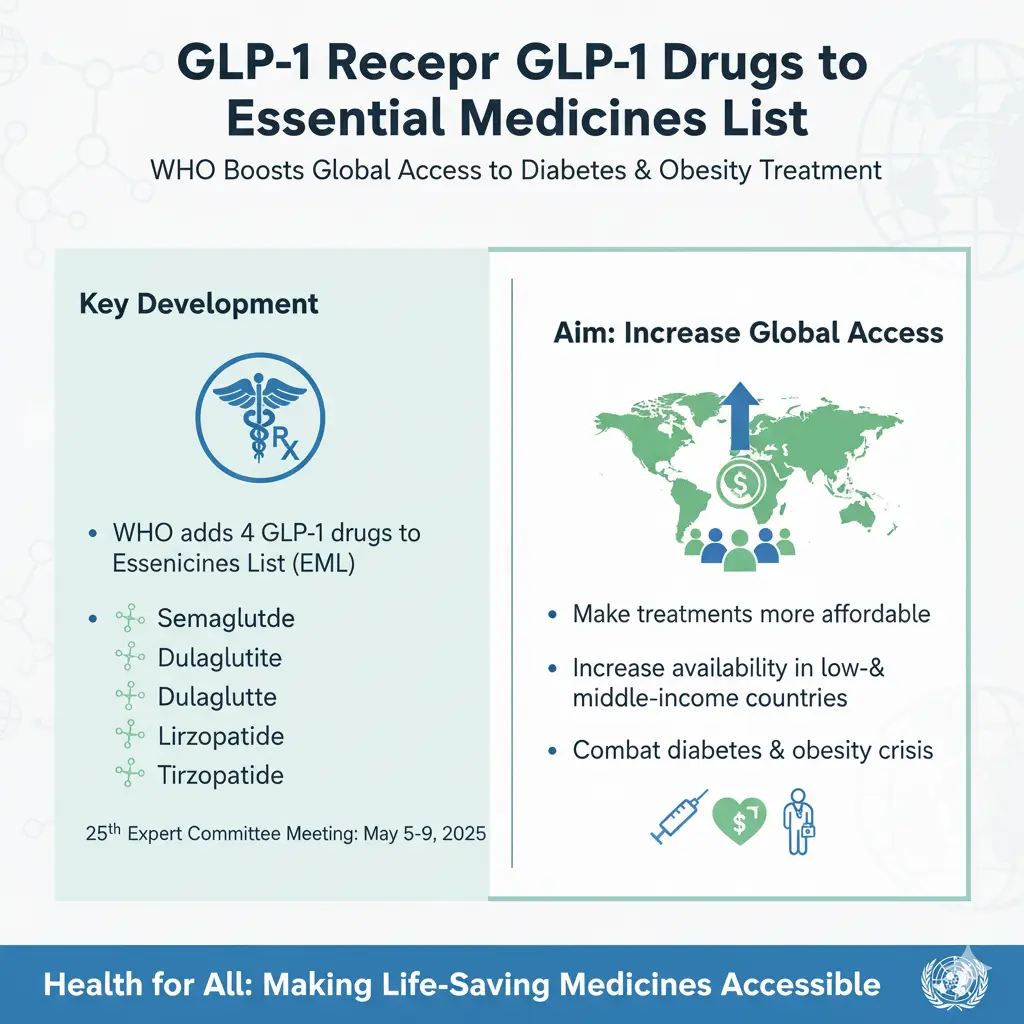September 17, 2025
GLP-1 Drugs in WHO List: 4 Transformative Benefits for Diabetes & Obesity Care
GLP-1 (Glucagon-Like Peptide-1)
The World Health Organization (WHO), during its 25th meeting of the Expert Committee on Essential Medicines (held from May 5–9, 2025), added four GLP-1 receptor agonist drugs — semaglutide, dulaglutide, liraglutide, and tirzepatide — to its Model List of Essential Medicines (EML).
- This inclusion aims to increase global access to effective diabetes and obesity treatments by making them more affordable and widely available, especially in low- and middle-income countries.
Key Points: GLP-1 (Glucagon-Like Peptide-1)

Drugs Added to EML:
- Semaglutide, Dulaglutide, Liraglutide, Tirzepatide
- Used for Type 2 diabetes mellitus patients with cardiovascular disease, chronic kidney disease, or obesity.
Significance:
- Global burden of diabetes: Over 800 million people (2022 data), with half untreated.
- Obesity crisis: Over 1 billion people worldwide, increasing rapidly in developing countries.
- These drugs reduce blood glucose, aid in weight loss, and improve cardio-metabolic health.
Challenges:
- High prices make these drugs unaffordable for most people, especially in developing countries like India.
- Out-of-pocket expenditure on non-communicable disease medicines is a major barrier.
Expert Opinions:
- V. Mohan (DMDSC): Inclusion shows strong scientific evidence; also beneficial for weight reduction and obesity management.
- Anoop Mishra (Fortis C-DOC): While a good step, low-cost essential drugs for diabetes and heart diseases should also be prioritized for mass benefit.
- R.M. Anjana (DMDSC): Helps in access and affordability, but not suitable as a first-line drug for all patients.
About GLP-1 (Glucagon-Like Peptide-1) Drugs:
- GLP-1 receptor agonists are a class of drugs used for Type 2 diabetes treatment.
- Functions:
- Stimulate insulin secretion when blood sugar is high.
- Suppress glucagon release (lowers glucose production by the liver).
- Slow gastric emptying, reducing appetite and aiding weight loss.
- Improve cardio-metabolic health.
- Recent Developments:
- Injectable semaglutide approved for metabolic dysfunction-associated steatotic liver disease (MASLD).
- Increasing use in obesity management beyond diabetes.
Implications for India:
- May help improve availability and affordability of advanced diabetes care drugs.
- But only a small segment of patients will benefit due to high costs.
Need for policy focus on low-cost essential medicines for wider population benefit.
Gist of daily Article /The Hindu 17oct 2025
October 17, 2025
Daily Gist of the Hindu/Indian Express : 16 Oct 2025
October 16, 2025
Daily Gist of The Hindu/Indian Express: 6 Oct 2025
October 6, 2025
Daily Gist of Article /The Hindu /Indian Express: 24 Sep 2025
September 24, 2025
